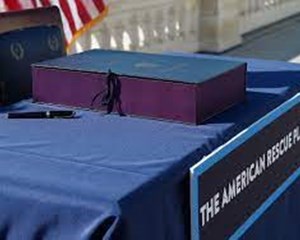The free market is dead. What comes next?
自由市场已逝,接下来呢?
By Chris Hughes
作者:克里斯·休斯
When the covid-19 pandemic struck, world markets came to a standstill. Governments around the world froze as much in-person economic activity as possible and opened their wallets to spend unprecedented sums of money to replace lost income. In the U.S., Republicans and Democrats agreed to invest record sums, nearly 20% of GDP. For the second time in 12 years, free markets had broken down, and government stepped up.
新冠大流行爆发后,全球市场陷入停滞。世界各国政府都在竭尽全力冻结其经济活动,并打开国库,花大把大把的钱来弥补收入损失。在美国,共和党和民主党都同意投入前所未有的超额巨款(接近GDP的20%)。这是自由市场12年来第二次崩溃,政府也加强了干预。
If the message wasn't clear before, it's now become impossible to miss: Government steps in when the going gets rough, ensuring that wealthy risk takers will be bailed out in the worst of times. Markets don't exist before the state does, and the state doesn't intervene in their natural work. But the state makes markets possible.
如果说之前的信息还不明朗,那么现在已经不可能错过了:当形势艰难时政府就该介入了,以此来确保大的风险承担者能够在最糟糕的时候获得帮助,从而摆脱困境。市场不会先于政府而存在,政府也不应干预市场的自然运作,但国家能让市场成为可能。

We are witnessing the most profound realignment in American political economy in nearly 40 years. President Ronald Reagan summed up the conventional wisdom that reigned from the mid-1970s onward in the U.S.: "Government is not the solution to our problem, government is the problem." Economists, policymakers and everyday Americans alike generally accepted that markets, unfettered and free, are the best way to create economic growth.
我们正在目睹美国政治经济近40年来最深刻的重组。罗纳德·里根总统总结了20世纪70年代中期以来统治美国的传统观念:“政府解决不了我们的问题,政府本身就是问题。”经济学家、政策制定者和普通美国人都普遍认为,不受约束的自由的市场是创造经济增长的最佳途径。
That ideology began to crack after the 2008–2009 Great Recession, and in the wake of the COVID-19 pandemic it has collapsed. The rise of ethno-nationalism on the right and democratic socialism on the left testifies to the growing disillusionment with the conventional wisdom on how government and economics are supposed to work.
这种意识形态在2008-2009年的大衰退之后开始瓦解,在新冠大流行之后已经崩溃。右翼的种族民族主义和左翼的民主社会主义的兴起,证明人们对政府和经济应该如何运作的传统观念日益幻灭。
Cross-partisan supermajorities of Americans want some of the biggest companies in America broken up, significantly higher minimum wages and a wealth tax on billionaires, and believe significantly more public investment is required to create economic growth.
跨党派的绝大多数美国人希望拆分美国一些最大的公司,大幅提高最低工资,对亿万富翁征收财富税,并认为需要大幅增加公共投资来创造经济增长。
We have had regulations, public investment and macroeconomic management to varying degrees throughout American history. What makes this moment different is people across parties, classes and educational backgrounds are using a new framework to think about how we create prosperity.
纵观美国历史,我们经历过不同程度的监管、公共投资和宏观经济管理。而此时的不同之处在于,不同党派、不同阶层、不同教育背景的人们正在用一种新的框架来思考“我们该如何创造繁荣”。
译文由可可原创,仅供学习交流使用,未经许可请勿转载。











